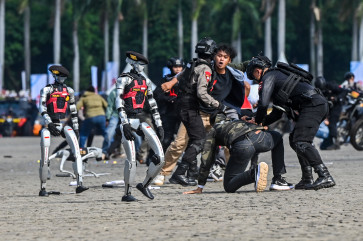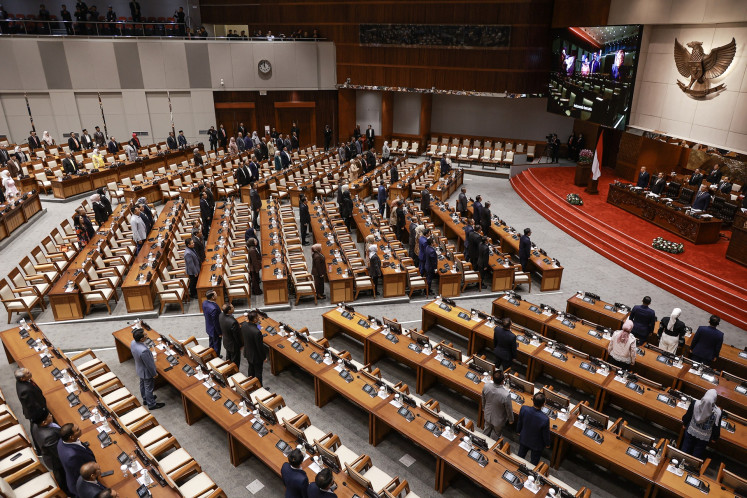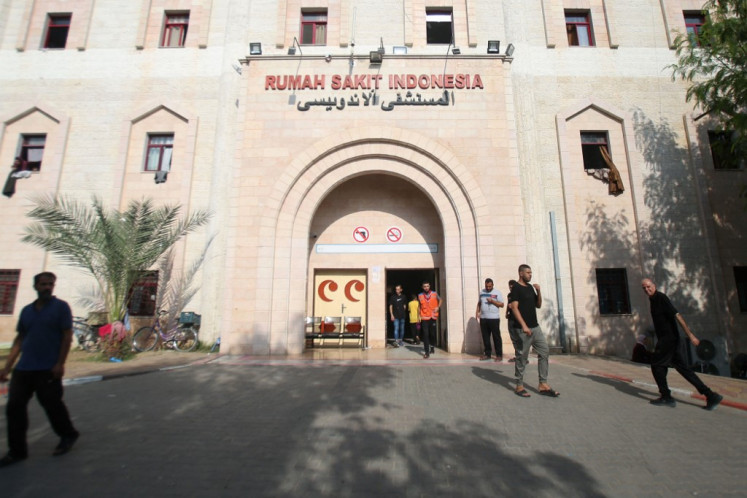Popular Reads
Top Results
Can't find what you're looking for?
View all search resultsPopular Reads
Top Results
Can't find what you're looking for?
View all search resultsEstablishing culture embracing change
Courtesy of Shangri-La Hotel SurabayaShangri-La Hotel, Surabaya general manager Martin Brenner vouches for the power of an empowered and motivated team to meet constantly changing customer-needs
Change text size
Gift Premium Articles
to Anyone
Courtesy of Shangri-La Hotel Surabaya
Shangri-La Hotel, Surabaya general manager Martin Brenner vouches for the power of an empowered and motivated team to meet constantly changing customer-needs.
Austrian hotel executive Martin Brenner believes that with today's changing environment in the hospitality industry, hotels should be flexible in terms of approaches to customer service.
'Today's hotel industry is about looking after the very specific needs of each and every guest,' said the 42-year old.
Following is an excerpt of an interview.
What are the most challenging issues related to management in the hotel that you lead? How did you deal with the issues successfully?
There are of course lots of small issues and challenges that need to be handled on a daily basis, but the biggest risk or challenge ahead is an ever faster changing environment we are operating in. The hotel and restaurant industry has become so fluid and is moving and changing so quickly and if we want to continue to be successful we need to make sure we adapt to the business environment.
Therefore, we need to stay on top of changes in the market and the team needs to form new strategies and make changes in the organization on a regular basis. This means that the complete team of the hotel must have a culture that embraces change.
What is your view on local culture in relation to the development of the hospitality industry? In what way does local culture contribute to the development of the hotel industry?
I am a firm believer that hotels need to integrate and blend with the local culture. Putting myself in the shoes of a guest, I would like to experience the culture of a place I visit when staying at a hotel. Even in a modern environment, the guest must be able to get a feeling of a 'sense of place' through local touches to the hotel facilities and the services offered.
What is your management style or philosophy? How does this management style benefit you in running Shangi-La Hotel, Surabaya?
In today's working environment, a cookie-cutter or one-size-fits-all approach to customer service is not possible anymore. Today's hotel industry is about looking after the very specific needs of each and every guest.
Therefore, I empower my team to be able to make decisions on guest contact point. Also the next generation of hospitality professionals that are entering the workplace now, expect to be part of the decision making and planning process. Therefore I like to encourage involvement and creativity at all levels of the organization which also helps to keep the team motivated and focused on guest service and satisfaction.
How do you instill a genuine spirit of working honestly and professionally in each of your employees? How do you encourage your employees to provide exceptional service to the hotel's customers?
This process really starts at the hiring point. The skill set of new colleagues is secondary. What I am looking for is personality and passion. Skills can be trained but personalities are unique. If we manage to hire the right people then honesty and professionalism is never a problem.
What kind of work environment do you want to create for the employees in the hotel? Why? How important is employee input in your decision-making process?
The point is that our people must enjoy their work and like what they do, as otherwise they will not be able to delight our guests. Therefore, the work environment must be fun and everybody able to speak up and participate. Our people can voice their ideas, opinions and issues and they are assured that management takes their input seriously. We also encourage our people to go and try out other departments through cross-exposure programs that enhance their knowledge and helps them to build careers.
In your opinion, what makes a leader successful? What qualities should a leader have?
A successful leader must be able to create a sustainable business environment and must inspire the team to excel in their duties. Positive thinking, open communication, commitment and passion are also important attributes of a leader, but I believe that a leader must be able to connect with the team on every level.
You were appointed as GM of Shangi-La Hotel, Surabaya, on July 1, 2012. Could you share interesting aspects of being the general manager, especially as it relates to day-to-day operations given that you are an Austrian national?
The most exciting part of being a GM of a five-star hotel is that no day is the same. Every day comes with new challenges and surprises that need to be managed. I love the interaction with my team and our guests, and I really enjoy working with people from different backgrounds and with different cultures, which I see as a big benefit when working in hotels.
Are there any valuable life experiences that have now become important management strategies for you in running a hotel?
Over the years I have realized that the most important part of a successful hotel is actually the people working in the hotel. Therefore, the majority of my effort goes into our team and their development. As a GM, it is important to be close with colleagues at every level and ensure that the hotel's strategy and goals are aligned with the organization.
What made you decide to pursue a career in the hospitality industry, particularly in the hotel sector?
After completion of secondary school I was undecided about what line of business I wanted to enter. I first decided to continue my studies in economics and trade but found out after one year that I did not enjoy this field. Therefore, I decided to join a hotel and tourism school and this was the beginning of my career in hospitality.
You have been with Shangi-La Hotels and Resorts for 10 years in Manila, Kuala Lumpur, Cebu and Bangkok. Could you tell us the best practices related to managing people in the hotel industry? What advice do you have for young hotel executives?
In order to get the best out of people you need to give them the freedom to express themselves. I remember when I started in the hospitality industry it was the norm that all employees must look and do the same thing every day. If you fell out of line, than you got into trouble with your superior.
The management style those days was very much based on a military system. Since then times have changed and organizations are now encouraging a more individual approach that highlights each person's character. In order to function properly, every business needs to have guidelines and policies that form a framework. People within the organization must be aware of the boundaries of this framework, but everybody is encouraged to use their creativity and ideas to get the job done.
My advice to young hotel executives is that our business is not easy to master and it requires a lot of personal sacrifice to be successful. We work long and sometimes funny hours and we are most busy when other people and our guests are off work.
During my career I have seen many people enter the hospitality industry without understanding the commitment needed be successful and they were very unhappy and did not succeed.
The basic requirement to be a successful leader in our industry is to be passionate about customer service and to be a people person. After all, it is a great job to have, which enables you to travel the world and work in different countries with lots of people from different cultural backgrounds. 











